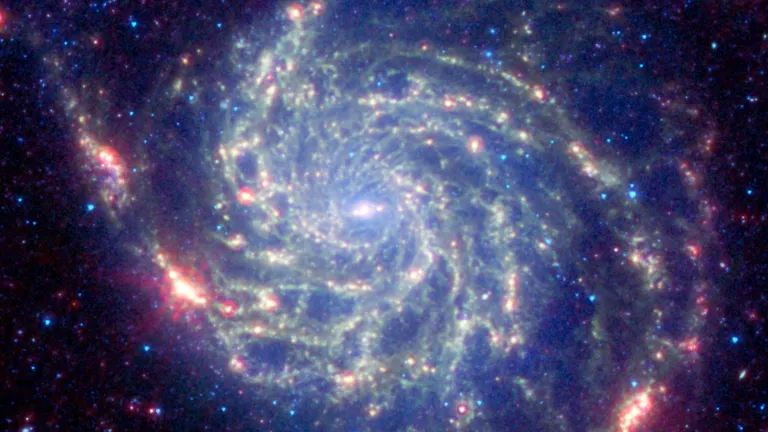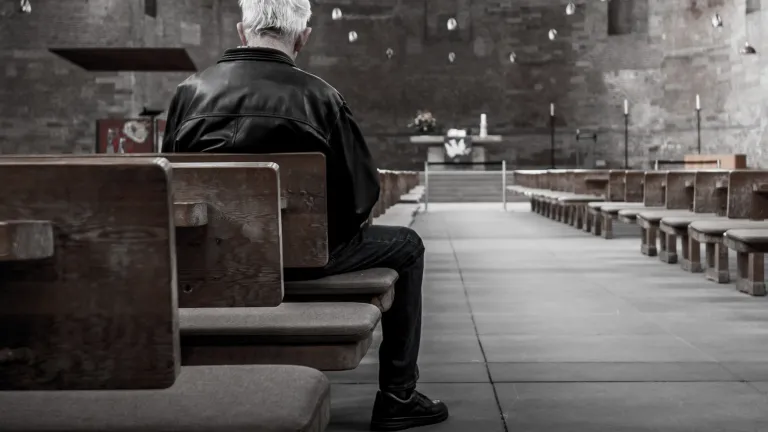The Surprising Sayings of Jesus Christ: 'You Are Gods'

Jesus stunned His listeners in proclaiming His own divine identity. But He went even further, quoting a verse that tells human beings, "You are gods." Indeed, as many passages show, God is a family.
In the last article in this series we saw that the Jews of Jesus' day accused Him of blasphemy for claiming to be the Son of God: "Because You, being a Man, make Yourself God" (John 10:33).
His response is intriguing: "Jesus answered them, 'Is it not written in your law [in Psalm 82:6], "I said, 'You are gods'"? If He [God] called them gods, to whom the word of God came (and the Scripture cannot be broken), do you say of Him whom the Father sanctified and sent into the world, "You are blaspheming," because I said, "I am the Son of God"?'" (John 10:34-36).
In other words, said Christ, "if Scripture outright called human beings gods, why are you upset when I merely state that I am God's Son?"
Yet are human beings actually gods? What did He mean?
In Psalm 82:6, from which Jesus quoted, God says to human beings: "I said, 'You are gods, and all of you are children of the Most High.'" The Hebrew word translated "gods" is elohim, which literally means "gods" or "mighty ones"—although it is often rendered as "God" (that is, the true God) in the Bible. That's because, although plural in form, the word elohim is often singular in usage.
Some have argued that the word in this context should be translated "judges" ("mighty ones" being seen by some here as simply powerful human beings). But the original New Testament manuscripts translate Christ's quotation in John 10 using the Greek word theoi—"gods." Indeed, it is obvious that Jesus must have meant "gods." If He had meant only "judges," His logic would not follow. Notice: "If Scripture called them judges, why are you upset that I claim to be the Son of God?" That makes no sense. Only when the word is rendered "gods"—and understood to mean that—does Christ's logic follow.
But, again, can human beings legitimately be referred to as gods, as Jesus said? How are we to understand this?
Terminology of family
The key here is the word children in Psalm 82. We must understand that God is a family. There is one God (the God family) comprising more than one God Being. (This is thoroughly explained in our Bible study aid booklet Who Is God?)
As explained in the previous article in this series, the God family from the beginning comprised two divine Beings—God and God the Word (John 1:1-3). The Word became flesh as the Son of God, Jesus Christ (John 1:14). And, after His human life and death, He was resurrected to divine spirit existence as the "firstborn from the dead" (Colossians 1:18) and "firstborn among many brethren" (Romans 8:29). Thus Jesus was spiritually born in the resurrection as the first of many "brethren" or children to follow later.
Indeed, from the beginning God intended to add many children to His family. In Genesis 1, after creating plants and animals to reproduce each "according to its kind," God said, "Let Us make man in Our image, according to Our likeness" (Genesis 1:26, emphasis added throughout)—showing that man was created according to the "God kind." To help us understand the parallel with God creating man in His image and likeness, Genesis 5:3 says that the first man Adam later "begot a son in his own likeness, after his image, and named him Seth." So God was essentially reproducing Himself through humanity.
The apostle Paul told the men of Athens, "... As also some of your own poets have said, 'For we are also His offspring'" (Acts 17:28).
Psalm 82 is much easier to understand in this light. In verse 6 the word gods is equated with "children of the Most High." That makes perfect sense. When any entity bears offspring, its offspring are the same kind of entity. The offspring of cats are cats. The offspring of dogs are dogs. The offspring of human beings are human beings. The offspring of God are "gods."
But we must be careful here. Human beings are not literally gods—not yet, at any rate. Indeed, people initially are not literally even God's children, except in the sense that He created humanity and did so in His image and likeness.
God is eternal spirit. Human beings are mortal flesh, albeit with a spiritual component—the human spirit that gives us understanding. This is an important distinction and helps us see what God was actually saying in Psalm 82.
The human beings He addressed stood in the place of God in judgment as elohim (Psalm 82:1). God, however, challenges them for their wrong judgments and lack of understanding (Psalm 82:2-5). Yet in Psalm 82:6, the verse Christ quoted, God confirms that they are indeed elohim. Psalm 82:7: "But you shall die like men, and fall like one of the princes." Thus, being physical and subject to death, they were elohim in only a very limited sense—the sense of being created in God's image and likeness as well as having the ultimate potential of becoming the same kind of beings the Father and Christ now are.
In fact, God often "calleth those things which be not as though they were" (Romans 4:17, King James Version)—looking on His purpose as already accomplished. Amazingly, God intends to exalt us from this fleshly existence to the same level of divine spirit existence that He has, as we will see.
Development—but into what?
This involves a process of spiritual reproduction in which God fathers us as His children. It starts with His Spirit joining with our human spirit: "The Spirit itself beareth witness with our spirit, that we are the children of God" (Romans 8:16, KJV). Through this miraculous union, we become "partakers of the divine nature" (2 Peter 1:4).
Thus the Spirit-begotten Christian is a child of God, an actual member of elohim, the family of God—but not yet in an ultimate sense. There is still a development process we must go through in this life. And at the end of this life, in the resurrection at Christ's return, true Christians will be changed into divine spirit beings like the Father and Christ.
The apostle John wrote: "Beloved, now we are the children of God; and it has not yet been revealed what we shall be, but we know that when He is revealed, we shall be like Him, for we shall see Him as He is" (1 John 3:2). We will receive the divine glory of the Father and Christ (Romans 5:2; 1 Peter 5:10; 1 Thessalonians 2:12; 2 Thessalonians 2:14; Colossians 1:27).
As coinheritors with Christ, we will receive dominion over all things, including the entire vast universe—dominion just as Christ has (Romans 8:17; Hebrews 2:5-9; Revelation 21:7). To truly exercise dominion over all things requires the omnipotent power of God.
What about our minds? As human beings, we couldn't count all the individual stars of the universe in a trillion lifetimes. But God, in a passing remark, says He knows all the stars by name (Psalm 147:4). Amazingly, Paul states, "Now I know in part, but then I shall know just as I also am known [that is, by God]" (1 Corinthians 13:12), showing that we will possess the omniscience of God. And why not, for we will have the Holy Spirit, the mind of God, in full?
Indeed, at that time, like Jesus, we will at last be "filled with all the fullness of God" (Ephesians 3:19; compare Colossians 1:19; Colossians 2:9). How can someone be filled with all the fullness of God and be anything less than God? Therefore, at our ultimate change, we too will be divine—though the Father and Christ will forever be greater than us.
The teaching of deification
This wonderful truth will surely come as quite a shock to those who have heard only the traditional view of mainstream Christianity regarding the ultimate reward of the righteous. Yet those who might be quick to assail this teaching will perhaps be even more surprised to learn that many early "church fathers" of mainstream tradition—not so far removed from early apostolic teaching—did understand this incredible truth, at least in part.
Notice paragraph 460 of the current Catechism of the Catholic Church (1995), footnotes in brackets:
"The Word became flesh to make us 'partakers of the divine nature' [2 Pet. 1:4]: 'For this is why the Word became man, and the Son of God became the Son of man: so that man, by entering into communion with the Word and thus receiving divine sonship, might become a son of God' [St. Irenaeus, Adv. haeres. 3, 19, 1: PG 7/1, 939]. 'For the Son of God became man so that we might become God' [St. Athanasius, De inc., 54, 3: PG 25, 192B]. 'The only-begotten Son of God, wanting to make us share in his divinity, assumed our nature, so that he, made man, might make men gods' [St. Thomas Aquinas, Opusc. 57:1-4]" (pp. 128-129, emphasis added).
This teaching is even more prevalent in Eastern Orthodox tradition, where it is known by the Greek term theosis, meaning "divinization" or "deification." However, it is wholly unlike the New Age concept of "I am god"—looking to the self as supreme. Notice the remarkable explanation of the early Catholic theologian Tertullian, writing around A.D. 200:
"It would be impossible that another God could be admitted, when it is permitted to no other being to possess anything of God. Well, then, you say, at that rate we ourselves possess nothing of God. But indeed we do, and will continue to do so. Only it is from Him that we receive it, and not from ourselves. For we will be even gods, if we deserve to be among those of whom He declared, 'I have said, "You are gods,"' and 'God stands in the congregation of the gods.' But this comes of His own grace, not from any property in us. For it is He alone who can make gods" (Ante-Nicene Fathers, Vol. 3, p. 480, quoted in "Deification of Man," David Bercot, editor, A Dictionary of Early Christian Beliefs, 1998, p. 200).
Of course, Christianity is not a polytheistic religion. There is but one God. The term gods is really meant to distinguish multiple God Beings constituting the one God—the one God meaning the one God family. As mentioned before, there are at present two fully divine members of that family—two distinct Beings—God the Father and God the Son, Jesus Christ. And, as incredible as it sounds, there will be more to come.
In fact, there are many more who are already members of the God family. Having a small measure of the divine through the Holy Spirit dwelling in them, they are in the process of deification. However, they are not yet themselves truly divine. But one day, if they remain faithful, they will be. And ultimately all of mankind—that is, those who are willing—will follow in the same course.
"I will be a Father to you, and you shall be My sons and daughters, says the Lord Almighty" (2 Corinthians 6:18). And He means it. God will not forever kid Himself into thinking we are His children when we really aren't. No, the Father intends to produce us as His full children, to transform us into the very kind of beings that He and Christ now are—though, again, forever subject to Their loving authority.
Indeed, even though saved human beings truly will be elevated to existence at the God level as real children of God and full members of the God family, they will never challenge, individually or collectively, the preeminence of the Father and Christ as leaders of the family. Truly, all will be subject to Jesus, except the Father, and Christ will Himself be subject to the Father (see 1 Corinthians 15:24-28). Their positions at the top of the family will never be challenged or threatened by even the addition of billions of divine children.
This, then, is the ultimate potential destiny of all mankind. It is the awe-inspiring purpose for which we were created. As Jesus quoted, foreseeing our destiny reached, "I said, 'You are gods.'" Let us all, then, be ever thankful. For it can't get any higher than that.






